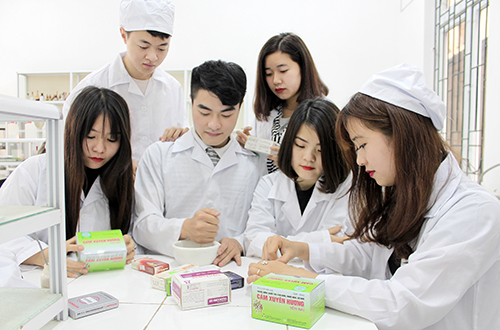Vietnam: Basic skills required for graduates of Pharmacy, Level 5 of VQF
On December 28, 2018, the Ministry of Labor, War Invalids, and Social Affairs of Vietnam issued Circular 54/2018/TT-BLDTBXH on the minimum knowledge volume and required competencies for graduates from intermediate (Level 4 of VQF) and college (Level 5 of VQF) levels in health and social service sectors.

Vietnam: Basic skills required for graduates of Pharmacy, Level 5 of VQF - Illustrative image
According to the regulation on the minimum knowledge volume and required competencies for graduates from intermediate and college levels in Pharmacy issued together with Circular 54/2018/TT-BLDTBXH, the basic skills required for graduates of Pharmacy, Level 5 of VQF in Vietnam are as follows:
- Present and apply the basic knowledge of microbiology - parasitology, anatomy and physiology, pathology, chemistry (inorganic, organic, analytical chemistry), and botany into pharmacy specialization.
- Describe the position, role, and function of the Pharmaceutical field within the Vietnamese healthcare system.
- Present and apply some basic contents of the Pharmaceutical Law and relevant legal documents related to pharmaceutical practice;
- Present the main characteristics of pharmacokinetics, effects, mechanisms of action, indications, unwanted effects, and contraindications of essential drugs, vaccines, and biological products in the list of essential medicines;
- Present the Vietnamese names, scientific names, usable parts, harvesting methods, preliminary processing, chemical composition, uses, and application methods of 100 traditional medicines and medicinal herbs in the list of essential medicines;
- Analyze the roles of the components in drug formulations;
- Distinguish pharmaceutical dosage forms and guide their use;
- Describe the manufacturing process of some conventional drug forms (powders, granules, tablets, capsules, ointments, creams, eye drops, injections);
- Analyze the process of managing production teams and the methods for planning, and organizing drug and functional food production;
- Present the regulations on sampling, sample preservation, sample destruction, and environmental regulations for examination;
- List the indicators and describe the testing methods in examining conventional pharmaceutical dosage forms and raw materials for medicines.
- Present the quality management system for medicines in Vietnam and the quality assurance regulations
- Present and apply the principles and standards of good practice (including GMP, GSP, GPP, GLP) in professional practice;
- Present the factors affecting the quality of medicines, chemicals, medicinal herbs, functional foods, cosmetics, and medical supplies;
- Present the regulations on the arrangement and storage of medicines, chemicals, medicinal herbs, functional foods, cosmetics, and medical supplies;
- Identify common drug interactions and propose measures to limit adverse interactions;
- Analyze appropriate drug use policies for specific populations: children, adults, the elderly, pregnant women, breastfeeding women, etc., and provide rational counseling based on clinical cases.
- Present and apply the concepts, rules, and basic principles of pharmaceutical economic management and pharmaceutical business management, pharmaceutical marketing in practice;
- Present fundamental knowledge of politics, culture, society, law, defense and security, and physical education according to regulations.
Details may be found in Circular 54/2018/TT-BLDTBXH effective from February 10, 2019.
Le Vy
- Number of deputy directors of departments in Vietnam in accordance with Decree 45/2025/ND-CP
- Cases ineligible for pardon in Vietnam in 2025
- Decree 50/2025 amending Decree 151/2017 on the management of public assets in Vietnam
- Circular 07/2025 amending Circular 02/2022 on the Law on Environmental Protection in Vietnam
- Adjustment to the organizational structure of the Ministry of Health of Vietnam: Certain agencies are no longer listed in the organizational structure
- Vietnam aims to welcome 22-23 million international tourists in Vietnam in 2025
-

- Number of deputy directors of departments in Vietnam ...
- 15:04, 05/03/2025
-

- Cases ineligible for pardon in Vietnam in 2025
- 14:43, 05/03/2025
-

- Decree 50/2025 amending Decree 151/2017 on the ...
- 12:00, 05/03/2025
-

- Circular 07/2025 amending Circular 02/2022 on ...
- 11:30, 05/03/2025
-

- Adjustment to the organizational structure of ...
- 10:34, 05/03/2025
-

- Notable new policies of Vietnam effective as of ...
- 16:26, 11/04/2025
-
.Medium.png)
- Notable documents of Vietnam in the previous week ...
- 16:21, 11/04/2025
-
.Medium.png)
- Notable documents of Vietnam in the previous week ...
- 16:11, 02/04/2025
-
.Medium.png)
- Notable new policies of Vietnam to be effective ...
- 16:04, 02/04/2025
-
.Medium.png)
- Notable new policies of Vietnam effective from ...
- 14:51, 21/03/2025
 Article table of contents
Article table of contents
